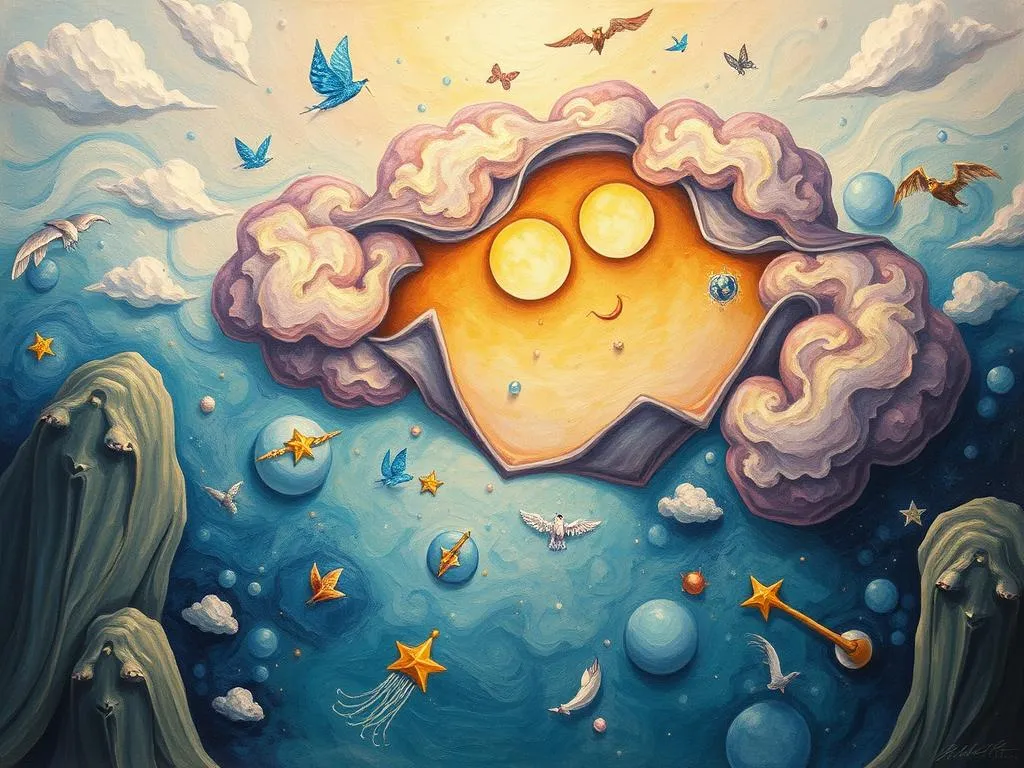
Have you ever woken up, your heart racing, from a dream that felt so real it lingered throughout your day? Dreams often weave a tapestry of our thoughts, fears, and experiences, acting as a bridge between our conscious and unconscious minds. In the realm of dreams, symbols are not merely random images; they hold deep meanings that reflect our inner selves and the world around us.
As we journey through the landscape of dreams, we can unlock the hidden messages they present. Understanding dream symbolism can illuminate our personal paths, offering insights into our emotions, relationships, and aspirations. Let’s delve into the fascinating world of dream symbols, guided by cultural perspectives, psychological insights, and practical advice.
Enigmatic Symbols: Decoding the Messages
Dream symbols can be as varied as our experiences, often carrying layers of meaning that depend on context and personal associations. Symbols in dreams can be personal, cultural, or universal, creating a rich tapestry of interpretation. Here are some key symbols that frequently appear in dreams, each ripe with meaning:
1. Water: The Flow of Emotions
Water is an incredibly powerful symbol in the dream world. It represents emotions and the subconscious mind. Clear, calm water may symbolize peace and clarity, while turbulent waters can indicate emotional turmoil. Consider how you felt in the dream—were you swimming effortlessly or struggling against the current? This can reveal your emotional state and how you are navigating your feelings in waking life.
2. Flying: The Desire for Freedom
Dreaming of flying often signifies a longing for freedom or escape. It can represent a desire to rise above challenges or gain a new perspective on life. However, if the flight is accompanied by fear or inability to control the flight, it may reflect feelings of anxiety or a fear of losing control in a situation.
3. Snakes: Transformation and Fear
In many cultures, snakes are seen as symbols of transformation and healing. They can reflect hidden fears or anxieties, but they also signify the potential for renewal. If you dream of a snake, consider your feelings towards it. Are you afraid, or do you feel a sense of curiosity? This can indicate how you are approaching change in your life.
4. Doors: Opportunities and Choices
Doors in dreams often symbolize opportunities and transitions. A closed door may represent missed opportunities or fear of the unknown, while an open door suggests new possibilities and a willingness to embrace change. Think about what lies beyond the door in your dream—this can give you clues about your own desires and fears regarding change.
5. Teeth: Insecurity and Self-Worth
Dreams about losing teeth are surprisingly common and often relate to feelings of insecurity about one’s appearance or self-worth. They can indicate a fear of aging or a sense of powerlessness in a situation. Reflect on the surrounding context of the dream to better understand what aspect of your life these feelings may be associated with.
By exploring these symbols, you can begin to piece together the narrative of your dreams, gaining insights into your emotional landscape and life situation.
Dreamscapes: Tales of the Mind
Understanding the symbols is just the beginning; the context of the dream matters just as much. Let’s explore some common dream scenarios and their possible interpretations:
1. Running Late
Imagine dreaming that you are running late for an important meeting. You check your watch, and the hands seem to spin faster than you can move. This dream often reflects feelings of anxiety and pressure in waking life. It could symbolize a fear of not being able to meet expectations or feeling overwhelmed with responsibilities. Consider what’s currently demanding your attention or causing you stress.
2. Being Chased
In this classic nightmare scenario, you find yourself running from an unseen pursuer. This dream often symbolizes avoidance of a situation or emotion. The identity of the pursuer can offer clues—are they someone from your past, or an abstract representation of your fears? This dream may suggest it’s time to confront whatever you’re trying to escape.
3. Naked in Public
Dreaming that you are naked in a public space can evoke feelings of vulnerability and exposure. This type of dream often relates to insecurities about how others perceive you. It may reflect concerns about revealing your true self or feeling unprepared for a situation in your waking life. Reflect on what aspects of your life are making you feel exposed or judged.
4. Finding Yourself in an Unfamiliar Place
In this dream, you wander through an unfamiliar landscape, perhaps a city or a house that doesn’t belong to you. This can symbolize exploration of your identity or a desire for change. Such dreams may arise during periods of transition, suggesting a need to navigate new environments in your life—whether physical, emotional, or relational.
5. Falling
Dreaming of falling is a common experience that often represents feelings of loss of control or fear of failure. It can indicate anxiety about taking risks or transitioning into a new phase of life. The sensation of falling can also be linked to feelings of insecurity—ponder what aspects of your life you may feel are slipping away or out of control.
Each dream scenario offers a unique lens through which to view your current life circumstances, providing an opportunity to reflect on your emotional state and personal growth.
Awakening Potential: Transforming Insights into Growth
Understanding dream symbolism and experiences is not just about interpretation; it’s about using these insights to foster personal growth. Here are some practical steps to harness the power of your dreams:
Embrace Dream Journaling
Keep a dream journal beside your bed, and jot down your dreams as soon as you wake up. Capture the symbols, feelings, and narratives. Over time, patterns may emerge, helping you connect your dreams to your waking life. This practice encourages self-reflection and can enhance your understanding of your subconscious mind.
Reflect on Your Emotions
Before diving into interpretations, take a moment to sit with your emotions. What feelings arose during the dream? How did you feel upon waking? Identifying and acknowledging these feelings can provide crucial context for the symbols and scenarios you encounter.
Explore Cultural Contexts
Different cultures view symbols through various lenses. For instance, in some cultures, snakes symbolize wisdom, while in others, they may represent danger. Research the cultural significance of symbols that appear in your dreams to deepen your understanding and appreciation of their meanings.
Set Intentions for Change
Once you have gleaned insights from your dreams, consider setting intentions for how you want to apply this knowledge. What aspects of your life do you want to change or explore further? Setting clear intentions can help guide your actions and decisions in your waking life.
Engage in Creative Expression
Sometimes, the best way to process dreams is through creative expression. Consider writing a poem, painting, or even dancing out your dream. Engaging your creativity can help you connect with your emotions and insights on a deeper level.
As you navigate the intricate web of your dreams and their meanings, remember that each dream is a whisper from your unconscious mind, urging you to explore, reflect, and grow.
In conclusion, the world of dreams is a vast and uncharted territory, ripe with symbolism and meaning. By embracing the messages contained within your dreams, you can transform fear into understanding and confusion into clarity. The dream world is not just a place of respite; it’s a treasure trove of wisdom waiting to be uncovered. So, the next time you wake from a vivid dream, take a moment to reflect on its symbols and stories, for they may hold the keys to unlocking your potential and guiding you on your path forward.







